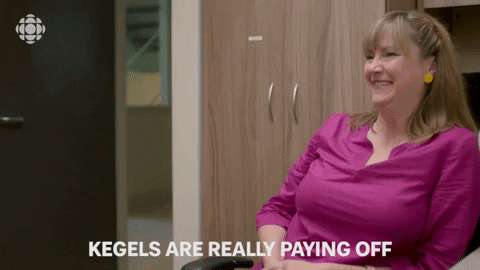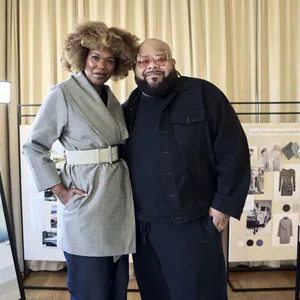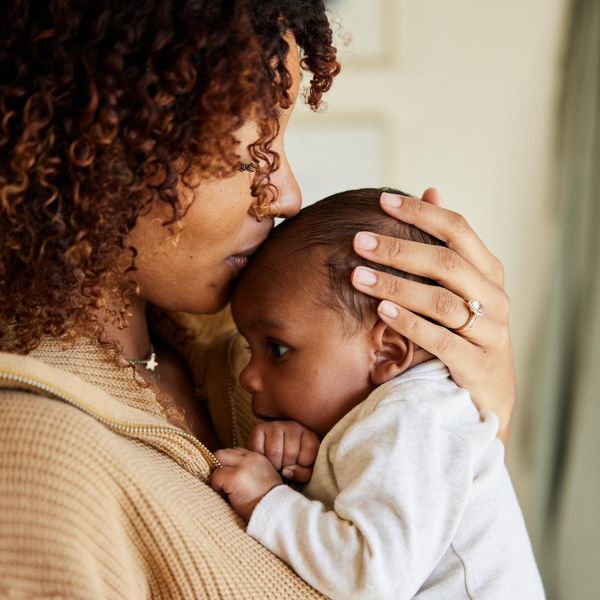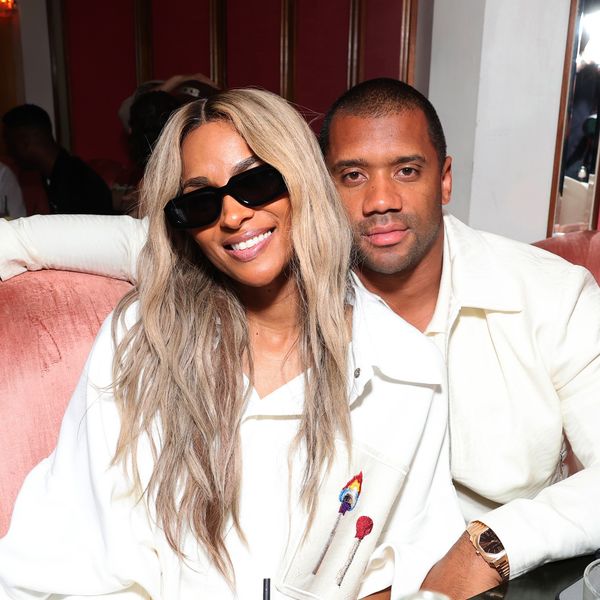Hormones. Adjusting to your new baby's all-over-the-place schedule. A lack of sleep. Internal body image issues. The low-key fear of getting pregnant again before you're ready (real talk). When you've just had a baby and you're trying to get back into the swing of what helped you to conceive in the first place, it can present all sorts of obstacles and issues that aren't talked about (in a public setting), nearly as much as it should be. It's not that you don't ever want to have sex again; it's more like you need some help getting from "wanting to want" to do it to actually doing it—again.
As a doula, I've helped many women (and patient partners) navigate their way through all of this. Whether you're just had a baby, you're weeks out from giving birth, or you're thinking about getting pregnant and you're wondering how it will affect your sex life on the back end, these 10 tips are practical ways for you to ease back into coitus after conceiving.
1. Get Cleared by Your Doctor

While it's a pretty standard assumption that a woman should wait for six weeks to have sex again after giving birth to a child, you might be surprised to know that many health professionals actually say that many ladies are good to go after three. It all depends on how well you're healing and if you're physically (and emotionally) up to it. But whether you experienced a vaginal birth or a cesarean (in all honesty, you probably will need six weeks in this case), it's important that you get a personal green light from your own physician before you get the party started again. Otherwise, you run the risk of contracting a uterine infection or even having some level of postpartum hemorrhaging.
2. Take a Probiotic
While this particular tip might seem a little odd, I'll break down why adding a probiotic to your diet regimen is so important. One thing that has been the reality for you, pretty much since you saw a positive sign on your pregnancy test, is your hormones have been all over the place. Well, aside from flushing out your system by eating fresh fruits, veggies and lots of water (so that detoxing can balance you back out), something else that can bring some balance to your hormonal system is a probiotic.
Since around 70 percent of our immune system is actually located in our gut, a probiotic can help to bring more good bacteria to that area of your body which will ultimately help to balance your hormones so that you can get to feeling more like your old self again.
As far as the best probiotics to take, click here for the kind of strains on the back of the bottle that you should be on the lookout for.
3. Do Some Kegels

If you had a cesarean, one thing you won't have to worry too much about is getting your vagina back into tip-top shape. But if you did experience a vaginal birth, kegels can really come to be your best friend when it comes to tightening your vaginal walls back up. While the reality is that your vagina will probably not fully return back to its pre-birth shape, time and kegels can get you close to around 80-90 percent. To tell you the truth, kegels is something that all women should do on a regular basis because, if a baby doesn't "shift" our vaginal walls, aging can cause our pelvic floor to become weaker and more fragile as well. Besides, kegels can do all sorts of other things for you like increase blood circulation to your vaginal area (which can intensify your orgasms), help to stop any bladder leakage that you might be experiencing and help to give your back and hips some additional support. For tips on how to do kegels correctly, click here.
4. Openly (and Mutually) Share Your Emotions
When you have a baby, everything is a "new normal"; to a certain degree, this includes your sex life. While it can certainly help to share what you're feeling with your physician and close friends (especially if they happen to be mothers too), the reality is they aren't the one who's having sex with you; your partner is. That's why it's so important to be willing to share your thoughts, concerns and maybe even fears with him and that you allow him to do the same with you. This isn't the time to get super defensive, self-conscious or to put up walls.
A foundational component of a thriving sex life is open communication.
The more you both allow the other to share their feelings, no matter how potentially awkward those feelings may be, the greater the chances are that the two of you will develop a newer sense of trust for one another—the more you'll feel wanted and needed on an unconditional level that goes way beyond the physical. And when two people are at this point and place, the sex has the potential to be so much better than it ever was before.
5. Bring the Romance Back In

It's kind of crazy that someone who is (usually) under 10 pounds can literally take over an entire house the moment they come inside of it. Suddenly it's like, whatever your baby wants, they cause you to forget that you have your own wants and needs too. This is another area where finding a sense of balance is so crucial. Although it may be a while before you're either up to going out and down to fully trust someone to watch your child while you do it, don't forget that you and your partner can still bring romance into your home. For starters, check out my article, "10 Romantic Dates You Can Go On (In Your Own Home)". Beyond that, be intentional about speaking each other's love languages, participate in some orgasmic meditation, give your man a nice massage (then have him return the favor). In a thriving sex life, before sex, there's foreplay and before foreplay, there's romance. As you ease back into having sex again, following this pattern can make getting back into the swing of things, so much easier for you to do.
6. Be Open to a Lil’ Oral Warm-Up First
If intercourse feels too uncomfortable, the first couple of times that you try to get back into the saddle of things, remember that oral sex is always an option. It's a pretty dope one too since a lot of women are able to experience orgasms a little quicker (and easier) that way. Not only that, but if you focus on receiving cunnilingus more during this time, that can help to bring more natural lubrication back into the picture as, again, your body is getting back used to you having sex again on the regular (if you need to bring in some lubrication during sex, by all means do, please). As a bonus, fellatio can be a good way for your partner to be able to get some of his own sexual pressure off until you're feeling better about having sex more consistently. Shoot, it's not like his sperm doesn't come with some health benefits for you in the process (check out "Do You Swallow? The Unexpected Health Benefits Of Sperm"). Just sayin'.
7. Try Positions That Leave Your Breasts Out of It

Any woman who's ever had a baby before (especially if she decided to breastfeed once her child was born) can vouch for the fact that figuring out how to "process" breasts is no easy feat. When you were growing up, they were all yours. When you got into a relationship, you sexually shared them with your partner. Now, you've got a little person who wants to cling to them constantly for sustenance's sake.
Shifting between all of those gears can be confusing and a little overwhelming, at times (not to mention the fact that your breasts don't actually feel the sexiest or most comfortable while they are engorged with milk). So, if you kind of want your breasts to sexually be off limits for a while, don't feel the least bit guilty about that. The workaround is to get into sex positions where your breasts aren't a major focal point.
Ones that immediately come to mind are spooning, the corkscrew, the flatiron, doggy style and the leapfrog (which is a variation of doggy style). If all of these names have you looking at your screen like, "huh?", Women's Health has offered up 46 sex positions, including pictures. You can check 'em out here in order to grasp a greater concept of what each position looks like.
8. Don’t Decide How Your Partner Sees You on Your Own
Not too long ago, I checked out the movie Conception. Although it had no Black people in it (I know, right?), it really was cute and offered up some super realistic moments when it comes to how women handle body image struggles after giving birth. As a doula, I'll be real with you—more times than not, bodies do change after having a baby; ones that take some time to get used to. Your breasts may not be as firm. Your tummy will probably not be as tight. You might have stretch marks. Your skin may have some discoloration. We already touched on the fact that your vagina may be looser. Listen, you just gave birth to a whole human being; that alters things.
But if there's something that a lot of women concern themselves with, if there's one thing that they really shouldn't obsess too much over, it's the feeling that their partner will not desire them in the same way because of all of the changes. Girl, that couldn't be further from the truth. First, if you're someone who wasn't really up to having sex during your entire pregnancy, your third trimester or even simply a few weeks leading into your due date, if you add to that the weeks of healing following giving birth, your partner has been waiting for a minute. He's gonna be nothing short of thrilled to get some again, regardless. And secondly, most of the men I've worked with (via being a doula) finds the woman who delivered their child to be a superhero. No joke. The fact that their partner was able to handle physically bringing a child into this world, earns that woman a level of respect and admiration that didn't exist prior to their son or daughter being born. And that can be really sexy to a man.
So, don't create fictional movies in your mind by assuming that just because you are feeling a little self-conscious (which is totally understandable) that your partner is looking at you with the same critical eye. Oftentimes, those full breasts, extra thickness and tiny lines are sexy AF to your partner. Hey, if you don't believe me, ask him.
9. Ease Slowly into It

Do you remember back when you gave your virginity (I don't like to use the word "lost" unless it's related to trauma; we know where our virginity "went")? If you were with an unselfish person who truly cared about you, he was prepared to take things slow because the first few times getting used to sex was probably awkward, uncomfortable and maybe even painful. That moment in time can actually help you to prepare for this one. While you do pretty much know what to expect when it comes to sex, getting used to it while your body is still getting readjusted can also result in awkwardness, uncomfortableness and maybe even a little bit of pain. There's no need to rush into what you're not fully ready for. Take your time. The more patient that you and your partner are with one another, the more at ease you will become, and the better sex can be (again).
10. Remember, Your Baby’s Too Young to Know
When you're trying to balance your sex life with a new baby, sometimes, you've gotta get in where you fit in. While I'm personally not a fan of babies being in the bed, pretty much from day one (co-sleepers are a dope alternative, though), whether your baby is in your bed or in the room with you, don't worry about if you've got to have sex with them in your presence. A lot of professionals say that babies don't start to cultivate lasting memories until around the 14-18 month mark and even then, it's usually nothing too substantial (lasting memories start to occur around three or so). So, have sex…whenever. Your baby won't remember a thing. Promise.
Join our xoTribe, an exclusive community dedicated to YOU and your stories and all things xoNecole. Be a part of a growing community of women from all over the world who come together to uplift, inspire, and inform each other on all things related to the glow up. We drop xoNecole events and special opportunities into our Tribe first.
Featured image by Shutterstock
- How To Fix A Sexless Marriage - xoNecole: Women's Interest, Love ... ›
- Here's How Your First Time Having Sex Can Still Affect You ›
- I'm Too Tired To Have Sex - xoNecole: Women's Interest, Love ... ›
- Best Time Of The Month: Sex & Conception - xoNecole: Women's ... ›
- A Sexpert & Mother Of Five Shares 7 Bedroom Tips That Are Perfect ... ›
- Motherhood Made Me Lose My Sex Drive - xoNecole: Women's ... ›
- The Reason We Stopped Having Sex After Our First Child ... ›
- Best Sex Positions That Are Safe For Pregnant Women - xoNecole: Women's Interest, Love, Wellness, Beauty ›
- Sex after a baby: 10 questions to ask yourself | NCT ›
- When Can You Have Sex After Having a Baby? ›
- Sex After Birth: How Long After Birth Can You Have Sex? ›
- Sex After Birth: What to Expect and How Long to Wait ›
- Sex After Birth: What to Do When It Just Doesn't Feel the Same ... ›
- 11 Ways To Ease Back Into Sex After Giving Birth ›
- 8 Surprising Truths About Sex After Birth | Parents ›
- Having sex after giving birth can be painful — here are 6 ways to help ›



























